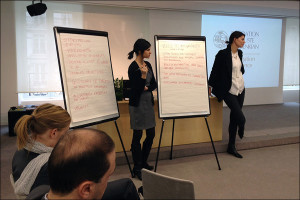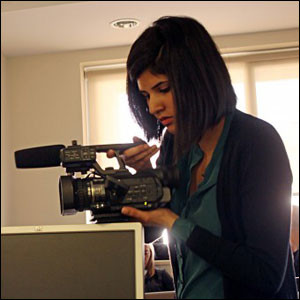A Global Glossary
Internship at the U.N. Leads to International Relations in Grad School
By Kelsey Allen for MIZZOU Magazine
Republished with permission.

Columbia, Mo. (Dec. 3, 2013) — Meenakshi Dalal, a journalism and French major set to graduate Dec. 13, 2013, has always been interested in different cultures. From a young age, the Naperville, Ill., native traveled internationally with her family. When she was 15, her family hosted foreign exchange students from France and Germany. Her junior year at Mizzou, she studied abroad in Paris.
A spring 2013 internship at the New York-based United Nations Alliance of Civilizations (UNAOC), a network formed in 2005 to improve cross-cultural relations between nations, was a no-brainer.
“It was this huge international experience in this one office in the Chrysler Building,” Dalal says.
Her job included working on Global Experts, a website that connects journalists with experts who provide quick responses after breaking news events. When a “cross-culturally difficult” thing happened, Dalal mined the UNAOC database for the appropriate global experts. She organized experts to opine on complex political, religious and social issues, including the death of Venezuelan president Hugo Chavez, religious rioting in Myanmar, and clashes between Tunisian citizens and police.
She also helped plan and execute a training workshop on digital tools and reporting across cultures in Amman, Jordan, for journalists from the Middle East and North Africa.

But it was the UNAOC conference “Covering Migration: Challenges Met and Unmet” that influenced Dalal’s future the most. She didn’t know much about international migration until that conference, which brought more than 35 editors in chief and migration experts from 27 countries to Paris to discuss how the media covers migration.
After that, she started noticing stories about migration everywhere she turned: The Associated Press dropped the phrase “illegal immigrant” from its stylebook. A group of senators filed legislation for a bipartisan immigration reform bill.
“All of a sudden, you could see migration way more in the media than before,” Dalal says. “Or maybe it was because I had attended this conference.”
After graduation, Dalal hopes to go to graduate school to study international relations with a focus on migration and public policy. The International Organization for Migration, which estimates the number of international migrants is 214 million, has an 81-page glossary of terms for journalists to reference when writing stories on the topic.
“What journalists write shapes public opinion, which in turn shapes public policy,” Dalal says. “But journalists are probably doing one story on migration and then moving on. If they’re not migration experts, they’re not going to know these terms. And even if they are, their readers are not going to know them.”
Dalal wants to research what the nomenclature of migration should be if not these nuanced, politically correct terms.
“It’s so messy, but that’s what I’m interested in finding out,” Dalal says.
Updated: September 2, 2020